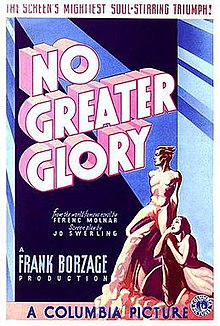No Greater Glory
| No Greater Glory | |
|---|---|
 Film poster | |
| Directed by | Frank Borzage |
| Written by | Ferenc Molnár (novel) Jo Swerling |
| Produced by | Frank Borzage |
| Starring | George P. Breakston Jimmy Butler Jackie Searl |
| Cinematography | Joseph H. August |
| Edited by | Viola Lawrence |
| Music by | R.H. Bassett Louis Silvers |
| Distributed by | Columbia Pictures |
Release date | March 30, 1934 |
Running time | 74 minutes |
| Country | United States |
| Language | English |
No Greater Glory is a 1934 American Pre-Code allegorical anti-war film directed by Frank Borzage and based on the novel A Pál utcai fiúk by Ferenc Molnár, known in English as "The Boys of Paul Street." The film's box office performance was described as "dismal".[1]
The film is noteworthy for employing mostly children in its cast; adults only appear in the opening scenes and then fleetingly thereafter. The action centers around an abandoned lumberyard where small kids play army. When a group of older boys unilaterally decide that they will take over the space for themselves, the younger children find themselves with little choice but to play soldiers for real, with tragedy almost inevitable.
Despite its box office failure, it has since become reappraised as an important film, with Leonard Maltin describing it in his Classic Movie Guide as "deeply felt" and "passionately acted," while Borzage authority Michael Grost noted its depiction of "the insidious appeal of militarism."
On August 23, 2019, Sony Pictures Home Entertainment released it as a Region 1 Made On Demand DVD.
Cast
- George P. Breakston as Nemecsek
- Jimmy Butler as Boka
- Jackie Searl as Gereb
- Frankie Darro as Feri Ats
- Donald Haines as Csonakos
- Rolf Ernest as Ferdie Pasztor
- Julius Molnar as Henry Pasztor
- Wesley Giraud as Kolnay
- Beaudine Anderson as Csele
- Ralph Morgan as Nemecsek's father
- Lois Wilson as Nemecsek's mother
- Christian Rub as The Watchman
References
- ^ Churchill, Douglas W. "The Year in Hollywood: 1934 May Be Remembered as the Beginning of the Sweetness-and-Light Era", New York Times [New York, NY], December 30, 1934: p. X5; retrieved December 16, 2013.
External links
- 1934 films
- American war drama films
- Anti-war films
- American black-and-white films
- Columbia Pictures films
- Films based on Hungarian novels
- Films based on works by Ferenc Molnár
- Films directed by Frank Borzage
- American political drama films
- Films produced by Frank Borzage
- Films with screenplays by Jo Swerling
- Films scored by Louis Silvers
- 1930s political drama films
- 1930s war drama films
- 1934 drama films
- 1930s English-language films
- 1930s American films
- 1930s drama film stubs
